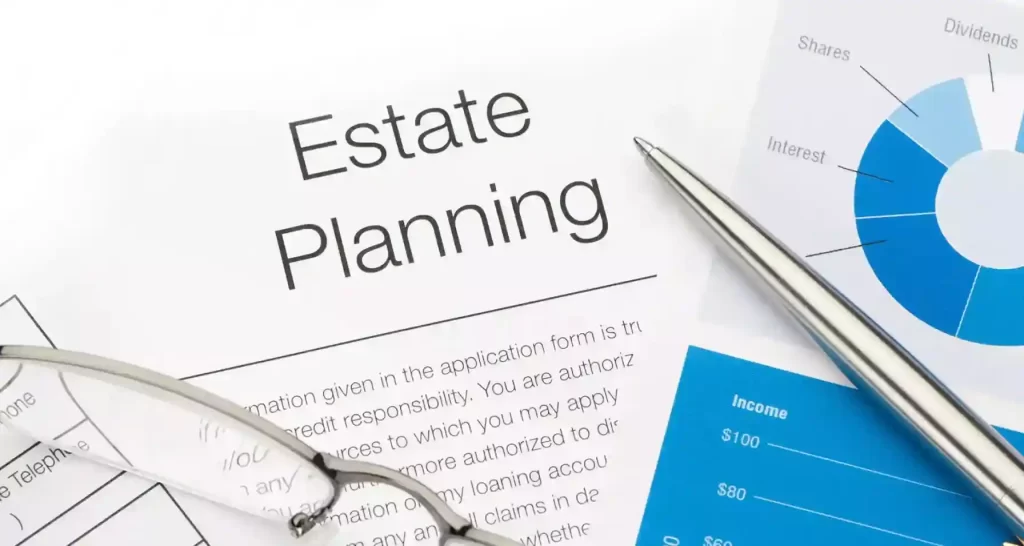Estate planning is the process of preparing for the management and distribution of your assets after your death. This includes creating a plan for the transfer of property, as well as the management of any financial or medical decisions that may need to be made in the event of incapacity.
There are many reasons why estate planning is important, regardless of the size of your estate. One of the primary benefits of estate planning is the ability to ensure that your assets are distributed according to your wishes. This can help to prevent family disputes and ensure that your loved ones are provided for after your passing.
In addition, estate planning can help to minimize estate taxes and avoid the time-consuming and costly probate process. It can also protect your assets from creditors and ensure that your healthcare and financial decisions are made by someone you trust in the event of incapacity.
In this blog, we will cover the different components of an estate plan, including wills, trusts, power of attorney, and advanced healthcare directives. We will also discuss the benefits of estate planning, considerations to keep in mind when creating a plan, and common misconceptions about estate planning. By the end of this blog, you will have a better understanding of how estate planning can benefit you and your loved ones.
Components of an Estate Plan
An estate plan typically consists of several key components that work together to help you achieve your goals for the transfer of your assets and management of your affairs in the event of incapacity or death. The following are the four main components of an estate plan:
- Will: A will is a legal document that outlines your wishes for the distribution of your assets after your death. It can also name guardians for minor children and specify funeral arrangements.
- Trusts: Trusts are legal arrangements in which a trustee holds and manages assets on behalf of a beneficiary. There are many different types of trusts, including revocable living trusts, irrevocable trusts, and special needs trusts.
- Power of attorney: A power of attorney is a legal document that gives someone else the authority to make financial or legal decisions on your behalf if you become unable to do so.
- Advanced healthcare directives: Advanced healthcare directives are legal documents that specify your wishes for medical treatment and end-of-life care if you become incapacitated and are unable to make these decisions for yourself. This can include a living will and a healthcare power of attorney.
By having these components in place, you can have peace of mind knowing that your wishes for the management of your assets and affairs will be carried out according to your desires, even if you are unable to make these decisions yourself.
Benefits of Estate Planning
There are numerous benefits to estate planning, including the following:
- Ensuring your assets go to the right people: By creating an estate plan, you can specify how your assets will be distributed after your death. This can help to avoid family disputes and ensure that your assets go to the people you want to receive them.
- Minimizing estate taxes: An estate plan can help you minimize the amount of estate taxes that your beneficiaries will have to pay. This can include strategies such as creating trusts, making gifts, and taking advantage of tax exemptions.
- Avoiding probate: Probate is the legal process of administering an estate after someone passes away. It can be time-consuming and expensive, but with an estate plan, you can often avoid probate altogether by using tools such as trusts and beneficiary designations.
- Protecting assets from creditors: Certain estate planning strategies can help protect your assets from creditors. For example, creating a trust can help shield your assets from potential creditors, while still allowing you to benefit from them during your lifetime.
Overall, estate planning can provide numerous benefits to you and your loved ones. By creating a plan, you can ensure that your assets are distributed according to your wishes, minimize taxes and expenses, and protect your assets from potential creditors.
Considerations When Creating an Estate Plan
When creating an estate plan, there are several important considerations to keep in mind to ensure that your plan is effective and reflects your wishes. These considerations include:
- Choosing an executor: Your executor is responsible for administering your estate after your death. It is important to choose someone you trust and who is capable of handling the responsibilities involved in this role.
- Updating your plan regularly: Your life circumstances may change over time, so it is important to regularly review and update your estate plan as necessary to ensure that it remains up-to-date and reflects your current wishes.
- Communicating your wishes to loved ones: It is important to communicate your wishes to your loved ones so that they understand your intentions and can help ensure that your estate plan is carried out according to your wishes. This can help prevent family disputes and confusion after your passing.
- Seeking professional help: Creating an estate plan can be complex, so it is important to seek professional help from an attorney or financial planner who specializes in estate planning. They can help ensure that your plan is legally sound and effective in achieving your goals.
By keeping these considerations in mind, you can create an estate plan that reflects your wishes and ensures that your loved ones are provided for after your passing.
Common Misconceptions About Estate Planning
There are several common misconceptions about estate planning that can prevent people from taking the necessary steps to protect their assets and ensure their wishes are carried out after their passing. Here are three of the most common misconceptions:
- Only the wealthy need an estate plan: This is a common misconception, but in reality, anyone who owns assets or has dependents should have an estate plan. An estate plan can help ensure that your assets are distributed according to your wishes and that your loved ones are provided for after your passing, regardless of the size of your estate.
- Estate planning is only for older adults: Estate planning is not just for older adults. Accidents and unexpected events can happen at any time, and having an estate plan in place can help ensure that your wishes are carried out if something unexpected happens.
- Estate planning is a one-time task: Estate planning is an ongoing process that requires regular review and updating. As your life circumstances change, your estate plan may need to be adjusted to reflect your current wishes and ensure that your loved ones are provided for.
By understanding these misconceptions and taking steps to create an effective estate plan, you can help ensure that your assets are protected, and your wishes are carried out according to your desires.
Conclusion
In conclusion, estate planning is an important task that can provide numerous benefits to you and your loved ones. By creating an estate plan, you can ensure that your assets are distributed according to your wishes, minimize taxes and expenses, avoid probate, and protect your assets from potential creditors.
When creating an estate plan, it is important to consider factors such as choosing an executor, updating your plan regularly, communicating your wishes to loved ones, and seeking professional help. It is also important to understand common misconceptions about estate planning, such as the idea that only the wealthy need an estate plan or that estate planning is a one-time task.
In order to ensure that your wishes are carried out after your passing, it is important to take action and create an estate plan as soon as possible. This can help provide peace of mind knowing that your loved ones will be provided for and that your assets will be distributed according to your wishes.
In summary, estate planning is a crucial step in ensuring that your assets are protected and your loved ones are provided for after your passing. Don’t wait to take action – consult with a professional and create an estate plan today.





